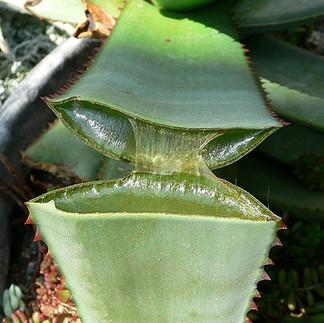Aloe
- Dave

- Mar 1, 2023
- 4 min read
Updated: Apr 8, 2025
Aloe Monograph

Botanical Name
Aloe Barbadensis
Common Name
Aloe, aloe vera, Barbados aloe, medicine plant, lily of the desert
Family
Asphodelaceae
Parts Used
Fresh leaves, dried leaf resin, and gel extracted from fresh leaves
Native To
Southern and Eastern Africa
Harvesting Guidelines
To harvest aloe vera, cut the mature outer leaves (18-24 months old) close to the base using a sharp knife, ensuring you leave the younger inner leaves intact. Slice open the leaves and scoop out the gel, using it fresh or storing it in the refrigerator for up to two weeks. Always avoid over-harvesting, allowing the plant time to heal and grow new leaves after each harvest.
Aloe vera, a revered plant used in both ancient and modern herbalism, has been known for its impressive array of healing properties. Historically, this succulent has been a part of human culture for thousands of years. Evidence suggests that aloe vera was utilized in ancient Egypt, where it appeared in tomb paintings and was integral to funerary rituals. Aloe vera’s therapeutic use can be traced as far back as 1750 BCE through Sumerian clay tablets, while Egyptian texts such as the Papyrus Ebers and the Book of Remedies referenced its medicinal benefits. It is said that Egyptian queens like Cleopatra and Nefertiti used aloe vera to preserve their skin’s beauty, applying it topically as part of their skincare rituals (1).
In modern medicine, aloe vera’s gel is known for its potent soothing effects, particularly in treating burns, sunburns, wounds, frostbite, and dermatitis. It has been scientifically validated for its ability to aid skin healing, reduce inflammation, and offer analgesic effects. Aloe vera contains compounds such as salicylic acid, magnesium, and various polysaccharides that contribute to its ability to reduce pain and inflammation, making it a popular ingredient in first-aid products.
Internally, aloe vera has long been used as a natural laxative due to its anthraquinone compounds. However, its benefits extend far beyond digestive health. Aloe vera has been traditionally used to balance metabolic issues, support kidney function, and even as an adjunct in chemotherapy to help alleviate side effects. More recently, studies have suggested that aloe vera may have antiviral properties, including its ability to inhibit the spread of HIV by limiting viral entry into healthy cells (2).
A particularly noteworthy area of research is its efficacy in managing chronic skin conditions such as psoriasis. A double-blind, placebo-controlled study examined the effects of aloe vera extract in a hydrophilic cream on individuals with moderate psoriasis. Over a four-week period, 83% of those using aloe vera extract saw significant improvement, with complete clearing of psoriatic plaques in many participants. In contrast, the placebo group showed only minimal improvement (3, 4). These results affirm aloe vera’s potential as a safe and effective topical treatment for psoriasis.
The versatility of aloe vera makes it a staple in both internal and external applications. It’s used in creams, gels, and ointments for healing, as well as in digestive formulations for its soothing and laxative properties. When using aloe vera internally, caution is advised, particularly for prolonged use. It is a potent cathartic and can lead to discomfort such as cramping and diarrhea when taken in large quantities over extended periods, potentially causing an electrolyte imbalance (5).
Adult Dose (dosage information from Hoffman medical Herbalism)
External: Apply leaf juice or gel topically as needed.
Internal: If using a commercial aloe product, follow the label’s dosage instructions.
Safety
Aloe vera is a strong cathartic and should be used with caution when taken internally; do not take aloe internally for longer than 1-2 weeks. Internal use can lead to painful stomach cramps and diarrhea and consequently disrupt electrolyte balance(5).
Actions
Analgesic,Antinflammatory,Antibacterial,Antimicrobial,Antiviral,Bitter,Cathartic,Demulcent,Emmenagogue,Emollient,Laxative,Stomachic,Vulnerary
Energy
Aloe vera’s energetic profile is cooling, which makes it particularly useful for conditions involving heat or inflammation.
References:
(1) Gage, D. (1996). Aloe vera: Nature’s soothing healer. Rochester, VT: Healing Arts Press.
(2) Tenney, D. (1997). Aloe vera. Pleasant Grove, UT: Woodland Publishing.
(3) Syed, T.A., Ahmad, S.A., Holt, A.H., Ahmad, S.A., Ahmad, S.H., & Afzal, M. (1996). Management of psoriasis with aloe vera extract in a hydrophilic cream: A placebo-controlled, double-blind study. Tropical Medicine & International Health, 1(4), 505-509. https://doi.org/10.1046/j.1365-3156.1996.d01-91.x
(4) Syed, T.A., Ahmad, S.A., Holt, A.H., Ahmad, S.A., Ahmad, S.H., & Afzal, M. (1996). Management of psoriasis with aloe vera extract in a hydrophilic cream: A placebo-controlled, double-blind study. Tropical Medicine & International Health, 1(4), 505-509. https://doi.org/10.1046/j.1365-3156.1996.d01-91.x
(5) Gladstar, R. (2008). Rosemary Gladstar’s herbal recipes for vibrant health. Adams, MA: Storey Publishing.
(6)Hoffmann, D. (2003). Medical herbalism: The science and practice of herbal medicine. Rochester, VT: Healing Arts Press.
Noteworthy Research
Aloe vera gel and Cesarean wound healing: A randomized controlled clinical trial.
Antifibrotic effect of aloe vera in viral infection-induced hepatic periportal fibrosis.
Effectiveness of aloe vera gel compared with 1% silver sulphadiazine cream as burn wound dressing in second degree burns.
A randomized study of chemotherapy versus biochemotherapy with chemotherapy plus Aloe arborescens in patients with metastatic cancer.
Effects of aloe vera cream on chronic anal fissure pain, wound healing, and hemorrhaging upon defecation: A prospective double-blind clinical trial.
Information offered on Achula and on this page is for educational purposes only. Achula makes neither medical claim, nor intends to diagnose or treat medical conditions. Women who are pregnant or nursing, and persons with known medical conditions, should consult their licensed healthcare provider before taking any herbal product. Links to external sites are for informational purposes only. Achula neither endorses them nor is in any way responsible for their content. Readers must do their own research concerning the safety and usage of any herbs or supplements.
tags:
Herbal medicine course
herbal school
wildpluk cursus
kruiden opleiding
geneeskrachtige planten
herborist
become a herbalist









